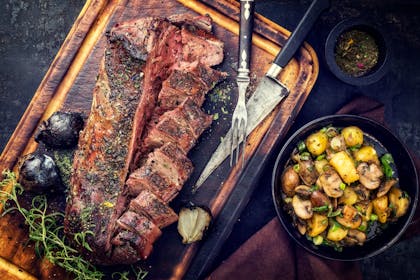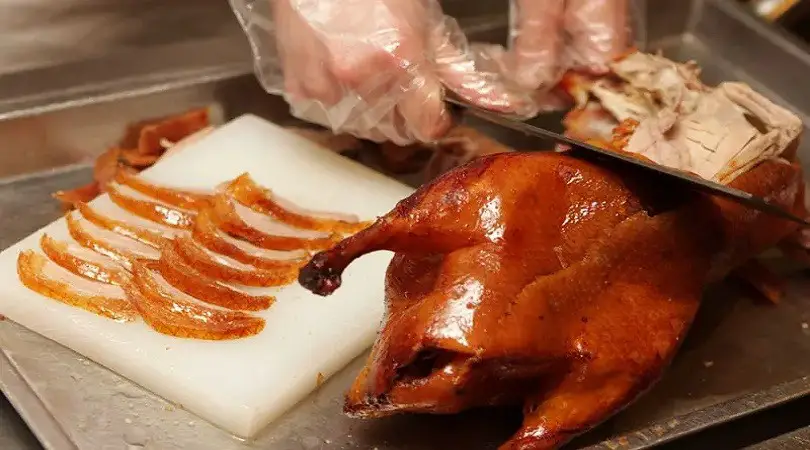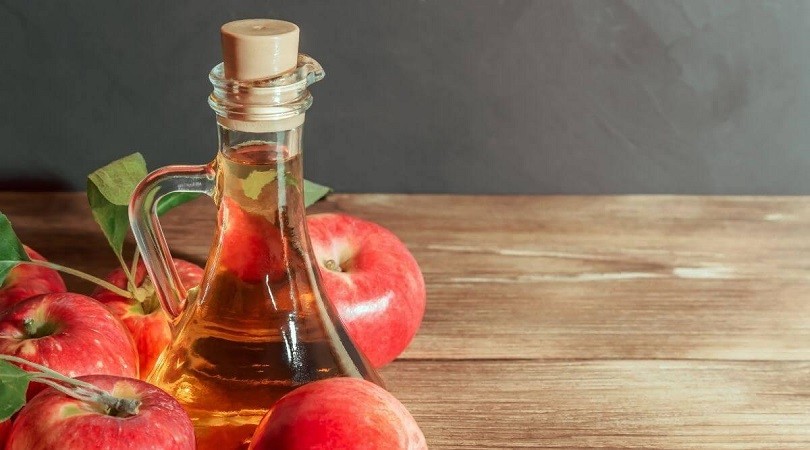Last Updated on January 6, 2025
Yes, you can eat venison during pregnancy as long as it is cooked thoroughly to prevent the risk of foodborne illnesses. Eating a well-balanced diet during pregnancy is important for both the mother and the baby’s health.
Venison, which is lean and rich in protein, can be a part of a healthy pregnancy diet. However, it is crucial to ensure that the venison is cooked thoroughly to kill any potential bacteria or parasites that can be harmful during pregnancy.
This is because raw or undercooked meat can pose a risk of foodborne illnesses such as toxoplasmosis and listeriosis, which can have serious consequences for the fetus. By cooking venison to the recommended internal temperature of 160°f (71°c), pregnant women can safely enjoy this nutritious meat option.

Credit: www.netmums.com
What Is Venison And Its Nutritional Value?
Venison, a term often associated with a tender and flavorsome meat, has gained popularity in recent years as a healthy and nutritious choice for many. But can pregnant women safely consume venison? Let’s dig deeper into what venison is and explore its nutritional value for expecting mothers.
Definition Of Venison And Its Common Sources
Venison refers to the meat obtained from various species of deer, such as white-tailed deer, red deer, or elk. It is a lean, dark red meat that is often compared to beef in taste and texture. This delicious meat is known for its rich flavor, making it a favorite among meat enthusiasts and chefs.
The most common sources of venison include:
- White-tailed deer: Found throughout north america and commonly hunted for sport or food.
- Red deer: Native to europe and asia, red deer are larger in size and also widely hunted.
- Elk: Native to north america, elks are known for their majestic antlers and are bred for both their meat and hides.
Nutritional Benefits Of Venison During Pregnancy
Venison is not only a delightful treat but also provides several nutritional benefits for pregnant women. Here are the key points to consider:
- High protein content: Venison is a rich source of high-quality protein, which is essential for the growth and development of the fetus.
- Low fat content: Compared to other meats, venison has lower fat levels, making it a healthier choice during pregnancy.
- Rich in iron: Iron is crucial for maintaining healthy blood oxygen levels and preventing anemia. Venison is an excellent source of iron, essential for both the mother and the baby.
- Abundant in vitamins: Venison contains a variety of vitamins, including niacin, riboflavin, vitamin b6, and vitamin b12. These vitamins play a crucial role in supporting the overall health of the mother and the baby.
- Rich in minerals: Venison is packed with essential minerals like zinc, selenium, and phosphorus, which are important for fetal development, immune function, and bone health.
- Omega-3 fatty acids: Venison from grass-fed deer can be a good source of omega-3 fatty acids, which contribute to brain development and may benefit the baby’s cognitive function.
Incorporating venison into a well-balanced pregnancy diet can provide expecting mothers with a range of essential nutrients.
Important Vitamins And Minerals Found In Venison
Venison is a nutritional powerhouse, containing a variety of important vitamins and minerals. Here’s a breakdown:
- Iron: Helps prevent anemia and supports oxygen transport in the blood.
- Niacin: Supports digestion, nerve function, and healthy skin.
- Riboflavin: Important for energy production and maintaining healthy skin and eyes.
- Vitamin b6: Aids in brain development and helps regulate mood and appetite.
- Vitamin b12: Essential for nerve function, brain health, and the formation of red blood cells.
- Zinc: Supports immune health, dna synthesis, and cell division.
- Selenium: Acts as an antioxidant, supporting immune function and protecting against cell damage.
- Phosphorus: Essential for bone and teeth health, as well as energy production.
These vitamins and minerals play vital roles in various bodily functions and are crucial during pregnancy for the overall health and well-being of expectant mothers and their babies.
Adding venison to your pregnancy diet can be a flavorful and nutritious choice. However, it’s always important to consult with your healthcare provider before making any dietary changes.
Safety Precautions For Consuming Venison During Pregnancy
Eating venison during pregnancy can be a delicious and nutritious choice, but it is essential to take certain safety precautions to safeguard both you and your baby. Here are some important points to keep in mind:
- Understanding the potential risks associated with eating venison while pregnant:
Venison, which refers to the meat of deer, can carry certain risks due to potential contamination. Some risks include exposure to bacteria, parasites, and environmental toxins. However, if proper safety measures are followed, these risks can be minimized.
- Guidelines for sourcing and preparing venison to ensure safety:
When it comes to choosing venison while pregnant, it’s crucial to prioritize safety. Here are some guidelines to follow:
- Opt for trusted sources: Purchase venison from reputable suppliers, such as specialty meat markets or reliable online stores, ensuring that the meat has undergone rigorous testing and has been handled properly.
- Ensure freshness: Freshly hunted venison should be cooled promptly after harvesting to prevent bacterial growth. Proper storage and handling are vital to maintain its quality and safety.
- Cook thoroughly: Cook venison to an internal temperature of 160°f (70°c) to kill any harmful bacteria or parasites. This ensures the safety of both you and your baby. Use a food thermometer to check the doneness accurately.
- Avoid cross-contamination: Practice good hygiene by thoroughly washing hands, utensils, and surfaces that come into contact with raw venison. This helps prevent the spread of bacteria and ensures the safety of other food items.
- Recommendations from healthcare professionals regarding venison consumption:
Healthcare professionals often advise pregnant women to exercise caution when consuming venison. While it provides essential nutrients like protein, iron, and vitamin b12, it is vital that these guidelines are followed:
- Moderation is key: Enjoy venison in moderation, as part of a balanced diet. Stick to the recommended serving sizes and avoid excessive consumption.
- Seek professional advice: Consult your doctor or a registered dietitian to ensure that venison consumption aligns with your specific dietary needs and health conditions. They can provide personalized recommendations based on your individual circumstances.
- Educate yourself: Stay informed about the potential risks associated with venison consumption during pregnancy. Being aware and well-informed enables you to make better decisions when it comes to your diet and overall well-being.
Remember that every pregnancy is different, and individual circumstances may vary. By following these safety precautions, you can enjoy venison while pregnant without compromising your health or that of your baby.
Benefits And Risks Of Eating Venison While Pregnant
Exploring The Potential Benefits Of Including Venison In The Pregnancy Diet
Venison, which refers to the meat of deer, has long been a popular choice for meat lovers. But when it comes to pregnancy, many women wonder whether it’s safe to consume. Let’s explore the potential benefits of including venison in your pregnancy diet:
- High nutritional value: Venison is rich in essential nutrients such as protein, iron, zinc, and b vitamins, which are all crucial for the healthy development of your baby and the overall well-being of your body.
- Low in fat: Compared to other types of meat, venison is relatively lean, making it a healthier option. It contains lower levels of saturated fats, which can be beneficial for maintaining healthy cholesterol levels during pregnancy.
- Natural source of omega-3 fatty acids: Venison is an excellent source of omega-3 fatty acids, which are essential for the development of your baby’s brain and eyes. These fatty acids also have anti-inflammatory properties, promoting a healthy immune system.
- Free of antibiotics and hormones: Wild venison, particularly hunted venison, is free of the antibiotics and hormones commonly found in commercially raised animals. This makes it a more natural and organic choice.
Understanding The Risks And Concerns Associated With Consuming Venison During Pregnancy
While venison can offer several benefits, it’s important to be aware of the risks and concerns associated with its consumption during pregnancy:
- Contamination with bacteria: Like any other raw meat, venison can carry bacteria such as e. coli and salmonella. Therefore, it’s vital to ensure proper cooking to eliminate potential risks.
- Toxoplasmosis risk: Venison, especially if improperly handled or undercooked, can pose a risk of toxoplasmosis, an infection caused by the toxoplasma parasite. This infection can potentially harm the developing fetus.
- Environmental contaminants: Wild game animals like deer may be exposed to environmental contaminants, including heavy metals and pesticides. These substances can accumulate in the meat and pose potential risks to both the mother and the baby.
Weighing The Pros And Cons To Make An Informed Decision About Venison Consumption
Making an informed decision about consuming venison during pregnancy requires considering the pros and cons. Here’s a summary to help you weigh your options:
Pros:
- Nutritional value: Venison provides essential nutrients, including protein, vitamins, and minerals, which are beneficial for both you and your baby.
- Low fat content: Being a lean meat, venison can be a healthier choice for those looking for a lower-fat alternative.
- Omega-3 fatty acids: Venison offers a natural source of omega-3 fatty acids, aiding in the development of your baby’s brain and eyes.
Cons:
- Bacterial contamination risk: Like any raw meat, venison can carry harmful bacteria if not handled and cooked properly.
- Toxoplasmosis risk: Improper handling or undercooking of venison can potentially expose you to toxoplasmosis, which can impact the health of your baby.
- Environmental contaminants: Wild game animals may be exposed to environmental contaminants that can accumulate in their meat and pose risks to pregnant women.
Ultimately, consulting with your healthcare provider and following proper cooking and handling guidelines can help you make an informed decision about including venison in your pregnancy diet.
Frequently Asked Questions Of Can You Eat Venison While Pregnant?
Can You Eat Venison While Pregnant?
Yes, you can eat venison while pregnant as long as it is cooked thoroughly to avoid any potential harmful bacteria.
Is Venison Safe To Consume During Pregnancy?
Yes, venison is safe to consume during pregnancy as long as it is properly cooked to eliminate any risk of foodborne illnesses.
What Are The Benefits Of Eating Venison During Pregnancy?
Eating venison during pregnancy provides essential nutrients like protein, iron, and omega-3 fatty acids, which support fetal development and overall health.
Are There Any Precautions To Consider When Eating Venison While Pregnant?
It is important to ensure that the venison is sourced from a reputable supplier and is cooked to an internal temperature of 160°f to prevent any potential bacterial contamination.
Can Eating Venison While Pregnant Have Any Negative Effects?
If cooked properly, eating venison while pregnant does not have any negative effects. However, it is crucial to avoid consuming undercooked or raw venison to avoid potential foodborne illnesses.
Conclusion
Eating venison during pregnancy can provide essential nutrients while adding variety to your diet. As a rich source of protein, iron, and vitamins such as b12 and zinc, venison can support the healthy development of both the mother and baby.
However, it is crucial to ensure the meat is properly cooked to avoid the risk of harmful bacteria. By following proper food safety practices, such as cooking venison to the appropriate temperature, pregnant women can enjoy the benefits of this lean and nutritious meat.
Remember to consult with your healthcare provider before making any changes to your diet. With moderation and proper preparation, venison can be a safe and enjoyable addition to your pregnancy diet. Ensure a healthy and well-rounded diet throughout your pregnancy to promote the optimal growth and development of your baby.











